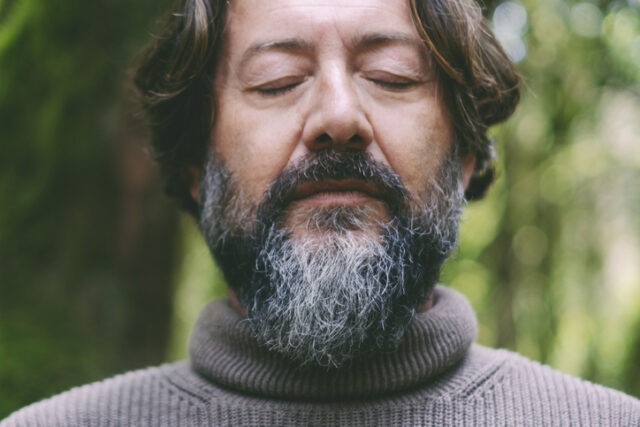Trusting your gut is generally good advice, but how do you know when you’re actually sensing that something is off or just panicking over nothing?

Sometimes you get a quiet feeling that something’s off, a little nudge that nags at you in ways you can’t quite explain. Other times it’s racing thoughts, worst-case scenarios, and a sense of panic. Telling the difference between intuition and anxiety isn’t always easy, but it’s possible if you know what you’re looking for. These subtle emotional clues can help you tell one from the other.
1. Intuition feels like a nudge, not a scream.

When intuition speaks, it’s often calm—more of a quiet knowing than a mental emergency. It might feel like a pause or a light tap on the shoulder. It doesn’t overwhelm you, but it does get your attention in a focused, grounded way.
Anxiety, however, comes in hot. It feels like urgency, dread, or spiralling thoughts that demand your full attention. It usually sounds loud, dramatic, and stressful because it’s your nervous system firing up in response to a perceived threat, not inner wisdom calmly guiding you.
2. Intuition is specific, while anxiety is scattered.

When something truly feels off, intuition will usually point to a specific person, place, or situation. It doesn’t leap from worry to worry—it stays focused. It might not offer full details, but it’s often tied to one clear area of your life.
Anxiety tends to jump all over the place. You might start out worrying about one thing and end up catastrophising five others. It creates mental noise that’s hard to quiet. If your thoughts feel disorganised or chaotic, it’s likely anxiety, not insight, behind the wheel.
3. Intuition leaves space for curiosity.

When intuition surfaces, there’s usually still room for reflection. You can sit with it, explore it, and ask yourself gentle questions. It feels like a suggestion, not a demand—something that opens a path, not shuts one down.
Anxiety rushes you. It wants answers, control, and certainty, and it wants them now. If you feel like you can’t rest until something is resolved or explained, anxiety is likely what’s fuelling that urgency. It resists openness because it’s working to prevent danger, even if no danger is present.
4. Intuition isn’t emotionally charged.

Even when intuition warns you of something, it tends to show up without emotional chaos. It feels clear, grounded, and direct, almost like a neutral internal alarm that doesn’t come with panic.
Anxiety, by contrast, is emotionally loaded. It’s often wrapped in fear, dread, guilt, or shame. If your body feels tense, your breath shortens, or you feel pressure in your chest or throat, that’s usually your nervous system reacting, not your inner voice offering guidance.
5. Intuition fades when it’s acknowledged.

Once you acknowledge intuition, it often feels like it’s done its job. It gave you the message, and it trusts you to do something with it when the time is right. It doesn’t demand ongoing attention.
Anxiety doesn’t fade; it lingers, loops, and doubles down. Even after you’ve acknowledged it, it finds new angles or “what ifs” to throw at you. If you feel mentally stuck or exhausted from trying to settle your thoughts, that’s likely a sign anxiety is still calling the shots.
6. Intuition doesn’t argue.

When your intuition speaks, it presents itself and steps back. It doesn’t try to convince you or dominate your thinking. It trusts your inner wisdom to take it from there.
Anxiety feels like a debate in your own head. It pushes back, second-guesses, and presents five contradictory arguments in the same moment. If your mind feels like a courtroom with no rest, anxiety is likely fuelling the conflict rather than calm insight being present.
7. Intuition is body-based, while anxiety is mind-based.

Intuition often speaks through the body—a gut feeling, a tightening in your chest, or an unshakeable sense that something doesn’t sit right. The sensation feels immediate, and even if you can’t explain it, it tends to be consistent.
Anxiety lives in the mind. It thrives on thought spirals, imagined scenarios, and “what ifs” that build and build. It might cause physical symptoms too, but the origin tends to be mental chatter. If your brain won’t stop trying to figure things out, anxiety may be the one talking.
8. Intuition doesn’t need outside validation.

When something is truly intuitive, you don’t feel desperate for confirmation. You might mention it to someone, but you don’t need them to agree. It feels personal, quiet, and solid, even when it’s hard to explain.
Anxiety makes you seek reassurance. It pushes you to ask others if your feelings are “normal,” if you’re overreacting, or if you’re doing the right thing. If you’re checking in with five different people, replaying conversations, or reading between the lines obsessively, that’s anxiety trying to soothe itself.
9. Intuition brings clarity, while anxiety brings confusion.

Even if intuition doesn’t solve a problem, it often brings a simple, grounded awareness. It might not have a plan attached, but it usually brings a “this is what I know” feeling that offers calm direction.
Anxiety muddies the waters. It makes you question everything, including yourself. If you feel more lost, indecisive, or overwhelmed the longer you think about something, that’s usually a sign you’re navigating an anxiety spiral, not an intuitive hit.
10. Intuition shows you the next step, not all the steps.

Intuition doesn’t overwhelm you with a full plan. It’s often quiet and present-focused. It tells you what to do right now, or what not to ignore. It’s a next-step kind of energy, rather than a carefully laid map of the foreseeable future (and beyond).
Anxiety wants control, so it demands a complete solution. You may feel pressure to figure everything out immediately or run through every possible outcome. If that’s the case, it’s likely anxiety spinning in its usual all-or-nothing thinking.
11. Intuition respects your capacity, but anxiety doesn’t.

Intuition tends to work with your energy, not against it. It waits, it whispers, and it nudges. If you’re not ready to act, it doesn’t force you to. It just leaves breadcrumbs for you to follow when you’re able.
Anxiety overrides your capacity. It insists you do something now, even if you’re exhausted, emotionally flooded, or unsure. It often hijacks your peace with pressure and urgency, rather than offering space to respond in your own time.
12. Intuition builds trust, while anxiety builds avoidance.

The more you honour intuition, the more confident you tend to become. You start noticing when your inner signals are right and become more attuned to subtle insights that help guide your life.
Anxiety tends to push you into habits of avoidance, overthinking, and second-guessing. It makes you question your ability to make decisions. If you often feel like you can’t trust yourself, or you’re stuck in indecision, that’s likely anxiety clouding your view.
13. Intuition can co-exist with calm, but anxiety replaces it.

Intuition often arrives in moments of quiet. It doesn’t stir panic or throw your body into alert mode. It can coexist with peace and stillness, even when the message it brings is serious. It sort of fits right in like a perfectly cut piece of the puzzle.
Anxiety shows up with tension. It replaces calm with urgency, and can even turn a peaceful moment into one filled with dread. If your nervous system suddenly feels activated for no reason, that might be a sign anxiety has taken over your mental space.
14. Intuition strengthens your connection to yourself, while anxiety creates distance.

When you act on intuition, you feel closer to yourself. Even if things don’t go perfectly, there’s a sense that you honoured your inner knowing. It feels empowering and aligned with who you are.
Anxiety creates inner disconnection. It leaves you feeling scattered, unsure, and often ashamed or exhausted. If you’re left feeling further away from your own clarity, intuition probably wasn’t the voice you were following—anxiety was just louder.




